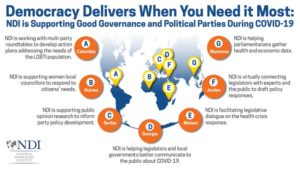 Throughout the centuries, competitors of the prevailing system have known that disaster presents them with an opportunity. Writing about the Black Death, which culled more than 40 per cent of Europe’s population, the historian David Herlihy (left) notes that the plague “discredited the leaders of society, its governors, priests, and intellectuals, and the laws and theories supported by them”, analyst Carl Benedikt Frey observes.
Throughout the centuries, competitors of the prevailing system have known that disaster presents them with an opportunity. Writing about the Black Death, which culled more than 40 per cent of Europe’s population, the historian David Herlihy (left) notes that the plague “discredited the leaders of society, its governors, priests, and intellectuals, and the laws and theories supported by them”, analyst Carl Benedikt Frey observes.
On the surface it might look as if Covid-19 has already turned a democratic recession into a depression. However, if political regimes are judged by how they have responded to the pandemic, a democratic depression seems unlikely: Covid-19 has exposed the flaws of authoritarianism while showing the strengths of democracy, he writes for The Financial Times:
- First, the lack of transparency in authoritarian regimes is undisputable and its consequences for fighting the pandemic catastrophic. In Turkmenistan, doctors are banned from diagnosing Covid-19 and people are not allowed to discuss the outbreak in public. And while China mobilised a strong national response when President Xi Jinping finally took action, in Wuhan local officials first tried to hush it up. This delayed decisive measures to curb the virus before its global spread.
- Second, democracies have responded more effectively to contain the contagion. My own research, with Chinchih Chen and Giorgio Presidente, shows that authoritarian regimes introduced more stringent lockdowns and rely more on intrusive contact tracing. But across 111 countries, we found that democracies’ lockdown measures were more effective in reducing movement and travel, which risks spreading the virus.

COVID PANDEMIC WHARTON
The capacity of a state and the degree of economic inequality among its residents will determine how successful it is in coping effectively with a pandemic like COVID-19. Whether it is a democracy or a dictatorship matters relatively less, according to research by Wharton management professor Mauro Guillen.
Research by The Economist on epidemics since 1960 found lower mortality rates in democracies than in dictatorships, he observes in “The Politics of Pandemics: Democracy, State Capacity, and Economic Inequality,” a working paper that tracks epidemic outbreaks in 146 countries since 1995. It is the first study to explore the effects of democracy, state capacity, and income inequality on epidemic dynamics.

NDI
“In democracies, greater transparency, accountability, and public trust reduce the frequency and lethality of epidemics, shorten response time, and enhance people’s compliance with public health measures,” Guillen wrote. However, “democracy has no effects on the likelihood and lethality of epidemics,” he said, citing two important takeaways:
- “The most important result in my analysis is that you have to have the resources, the capacity and the [requisite] state structures in place to deal with these national emergencies,” said Guillen. “Countries that score higher in state capacity, because they have more resourceful governments, regardless which party is running it, have fewer of these epidemics. And if they have one, they tend to have fewer deaths and cases.”
- The second takeaway from the study is that “for the most part, it doesn’t really matter whether you’re a democracy or a dictatorship,” he added. “But inequality can make the consequences of all of this much, much worse, especially in terms of the number of people affected.”
How can democracies best meet the challenges of COVID19? Join NDI President Derek Mitchell and NDI’s Director of Democratic Governance Kristen Sample to learn more. Listen to the full podcast here.
 So far, democracies with more collectivist cultural traits have responded better to the pandemic, adds Frey, author of ‘The Technology Trap: Capital, Labor, and Power in the Age of Automation’, and Citi Fellow at the Oxford Martin School, Oxford University. There is reason to believe that collectivist values will spread after coronavirus: a recent study in the Proceedings of the Royal Society found that collectivist versus individualistic attitudes vary with pathogen risk, suggesting that increases in disease exposure might make countries more collectivist. RTWT
So far, democracies with more collectivist cultural traits have responded better to the pandemic, adds Frey, author of ‘The Technology Trap: Capital, Labor, and Power in the Age of Automation’, and Citi Fellow at the Oxford Martin School, Oxford University. There is reason to believe that collectivist values will spread after coronavirus: a recent study in the Proceedings of the Royal Society found that collectivist versus individualistic attitudes vary with pathogen risk, suggesting that increases in disease exposure might make countries more collectivist. RTWT
Being a democracy and having state capacity are not always correlated. Some democracies are newly independent countries and relatively poor, and they don’t have strong government programs, said Guillen:
“Over the last 20 years, we’ve seen a lot of these countries — for example, in Africa — becoming democracies. But they lack resources and they lack strong government programs. Those are the most vulnerable, and this is why we see that so many epidemics ravage the developing world.”
It gets worse for poor countries that remain dictatorships. “They face a double whammy because they don’t have resources, and they don’t have strong government programs,” said Guillen. RTWT







